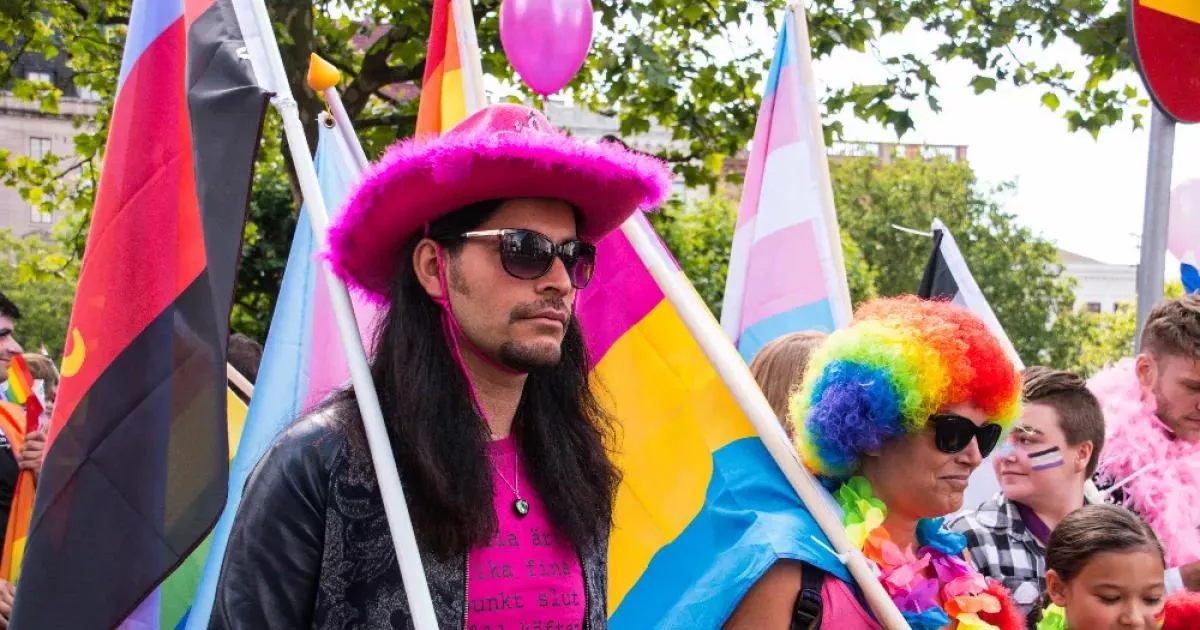Polyamory is the practice of having multiple romantic relationships with the full knowledge and consent of all partners involved. It's a form of consensual non-monogamy where individuals reject the idea that exclusivity is necessary for deep, committed relationships. While some polyamorous individuals maintain open relationships, others practice polyfidelity, restricting sexual activity to only members within their polyamorous group. Key aspects include open communication, honesty, and managing emotions like jealousy to foster healthy, ethical relationships across multiple partners.
1966: Inception of the Church of Satan
In 1966, the Church of Satan was founded. Since its inception, it has consistently held a policy of pluralism, accepting polyamorists, bisexuals, lesbians, gays, BDSM, transgender people, and asexuals.
1972: Publication of "The Gods Themselves" by Isaac Asimov
In 1972, Isaac Asimov published "The Gods Themselves", a novel that described an alien race in an alien dimension where romantic relationships are usually composed of three individuals and where conception, and orgasm, is only possible during sexual intercourse between all three partners at the same time (i.e., a threesome).
October 1980: Debut of Starfire in DC Comics Presents #26
In October 1980, Starfire, a fictional superhero appearing in books published by DC Comics, debuted in DC Comics Presents #26. She was depicted as a polyamorous character, raised on a world where open marriage was acceptable.
1983: Nonmonogamy under certain circumstances
According to a 1983 study, '15–28% had an understanding that allows nonmonogamy under some circumstances,' with percentages are higher among 'cohabitating couples (28%), lesbian couples (29%) and gay male couples (65%).'
1989: Polyamorous character introduced in Ranma ½ anime series
In 1989, the anime series Ranma ½ included a polyamorous character, Tatewaki, who is in love with both Akane and the "Pigtail Girl" (Ranma's female form) and proposes to date both, but they do not return his feelings.
May 1990: First appearance of the word 'polyamorous'
In May 1990, the word polyamorous first appeared in an article by Morning Glory Zell-Ravenheart, "A Bouquet of Lovers", published in Green Egg Magazine, as "poly-amorous".
1990: Beginning of The Wheel of Time book series
In 1990, Robert Jordan's fantasy book series "The Wheel of Time" began its run, notable for its inclusion of various polyamorous relationships throughout the narrative, including the protagonist Rand al’Thor, who enters a romantic relationship with three women.
May 1992: Creation of alt.polyamory Usenet newsgroup
In May 1992, Jennifer L. Wesp created the Usenet newsgroup alt.polyamory, cited as the first verified appearance of the word.
1992: Finnish study on sexual attitudes and relationships
In 1992, a comprehensive government study in Finland found that 8.9% of respondents agreed that they could maintain several sexual relationships at the same time.
1993: Oneida Community archives made available
In 1993, the archives of the Oneida Community were made available to scholars for the first time, containing the journal of Tirzah Miller.
1998: Tennessee court grants guardianship to grandmother and step-grandfather
In 1998, a Tennessee court granted guardianship of a child to her grandmother and step-grandfather, after the child's mother, April Divilbiss, and partners outed themselves as polyamorous on MTV.
March 1999: Prevalence of polyamorous arrangements
In March 1999, Geri Weitzman states that while openly polyamorous relationships are relatively rare there are 'indications that private polyamorous arrangements within relationships are actually quite common.'
1999: Conditions favorable to good experiences with polyamory
In 1999, Morin noted that certain conditions are favorable to good experiences with polyamory, but that these differ from the general population.
1999: Zell-Ravenheart defines 'polyamory' for OED
In 1999, Morning Glory Zell-Ravenheart provided a definition of 'polyamory' to the Oxford English Dictionary (OED) for the UK version as "the practice, state or ability of having more than one sexual loving relationship at the same time, with the full knowledge and consent of all partners involved."
2000: Rabbi Jacob Levin comes out as polyamorous
In 2000, Rabbi Jacob Levin came out as polyamorous to his synagogue's board in California but did not lose his job as rabbi.
2001: Founding of Unitarian Universalists for Polyamory Awareness
In 2001, Unitarian Universalists for Polyamory Awareness (UUPA) was founded to engage in ongoing education and advocacy for greater understanding and acceptance of polyamory within the Unitarian Universalist Association.
2001: Unitarian Universalists for Polyamory Awareness Founded
In 2001, Unitarian Universalists for Polyamory Awareness (UUPA) was founded. Its mission is to support, educate, and encourage spiritual wholeness regarding polyamory within the Unitarian Universalist Association and broader community.
2002: Publication of "Working with polyamorous clients in the clinical setting"
In 2002, a paper titled "Working with polyamorous clients in the clinical setting" by Joy Davidson addressed the importance of talking about alternatives to monogamy, how therapists can work with those exploring polyamory, basic understandings of polyamory, and key issues therapists need to watch for in the course of working with polyamorous clients.
2002: Futurama episode features polygamy and its legal acceptance
In 2002, the Futurama episode "A Taste of Freedom" featured Old Man Waterfall, who has seven wives and one husband. The Supreme Court holds polygamy as legal, though this leads to jeers from spectators.
2002: National Coalition for Sexual Freedom adds rights of polyamorous people to mission
In 2002, the rights of polyamorous people were added to the mission of the National Coalition for Sexual Freedom, an American sex-positive advocacy and educational organization.
2006: Polyamory added to the Oxford English Dictionary
In 2006, the words polyamory, polyamorous, and polyamorist were officially added to the Oxford English Dictionary (OED).
2007: Book Dreyd features a character in a polyamorous triad
In 2007, Daniel Help Justice's book Dreyd featured Tarsa, a priestess, warrior, and bisexual woman, as part of a polyamorous love triad.
2008: The Beast with a Billion Backs features polyamorous characters
The made-for-TV Futurama film, The Beast with a Billion Backs, published in 2008, featured two polyamorous characters: Colleen O'Hallahan and Yivo.
July 2009: Estimate of Openly Polyamorous Families in the U.S.
In July 2009, The Kinsey Institute estimated that there were half-a-million 'openly polyamorous families' in the United States.
September 2009: Publication of "What Psychotherapists Should Know About Polyamory"
In September 2009, a manual for psychotherapists who deal with polyamorous clients, called "What Psychotherapists Should Know About Polyamory" (written by Geri Weitzman and others), was published by the National Coalition for Sexual Freedom.
2009: Founding of polyamory.org.uk and representation in Love You Two
In 2009, Graham Nicholls founded www.polyamory.org.uk, the United Kingdom's first website about polyamory. The Mom of Pina in Maria Pallotta-Chiarolli's novel, Love You Two was shown to be polyamorous and bisexual.
2009: Canadian Polyamory Advocacy Association Founded
In 2009, the Canadian Polyamory Advocacy Association (CPAA) was founded to advocate for polyamorous Canadians and promote the acceptance of polyamory in legal, social, and governmental contexts.
2010: Polyamory as a Sexual Orientation Argument
In 2010, legal scholar Ann Tweedy argued that polyamory could be considered a sexual orientation under existing United States law.
2010: Premiere of Lost Girl with polyamorous character
In 2010, the series Lost Girl premiered, featuring Bo Dennis, a bisexual succubus involved romantically with Dyson and Lauren.
2010: Caprica portrays polyfidelitous marriage
In 2010, the television show Caprica portrayed several main characters in a polyfidelitous-style marriage consisting of multiple men and women.
November 23, 2011: Anti-polygamy law does not affect unformalized polyamorous households
On November 23, 2011, the Supreme Court of British Columbia ruled that the anti-polygamy law of Canada does not affect unformalized polyamorous households; this is why Polyamory Day is celebrated every year on November 23.
2011: American Horror Story: Hotel introduces Countess Elizabeth Johnson
In 2011, American Horror Story: Hotel began, with Countess Elizabeth Johnson, played by Lady Gaga, beginning a relationship with famed film actor Rudolph Valentino and his wife, Natacha Rambova, as seen in episode seven.
2011: Rabbi David Teutsch on monogamy vs. polygamy
In his book A Guide to Jewish Practice: Volume 1 – Everyday Living, published in 2011, Rabbi David Teutsch wrote that monogamy is not automatically a morally higher form of relationship than polygamy, and that if practiced with honesty, flexibility, egalitarian rules, and trust, practitioners may live enriched lives as a result.
2012: Premiere of Polyamory: Married & Dating
From 2012 to 2013, the American reality television series on Showtime, Polyamory: Married & Dating, was broadcast. It followed polyamorous families as they navigated the challenges presented by polyamory.
2012: Call for revision of bigamy laws
In 2012, legal scholar Deborah Anapol called for the revision of existing U.S. laws against bigamy to permit married persons to enter into additional marriages.
August 2013: Report on Non-Traditional Arrangements
In August 2013, The Guardian reported that 15–28% of heterosexual couples and about half of gay and bisexual people have a 'non-traditional' arrangement of some kind.
2013: Webcomic Kimchi Cuddles begins
Around 2013, the webcomic Kimchi Cuddles began, portraying polyamorous people like other characters.
2013: Rabbi Sharon Kleinbaum on polyamory and Judaism
In 2013, Sharon Kleinbaum, the senior rabbi at Congregation Beit Simchat Torah in New York, stated that polyamory is a choice that does not preclude a Jewishly observant and socially conscious life.
2013: Polyamory Action Lobby Founded
In 2013, the Polyamory Action Lobby (PAL) was founded in Australia to combat misconceptions about polyamorous individuals and advocate for their legal rights.
2013: Criticism of Polyamory
In a 2013 article in The Guardian, Julie Bindel criticized polyamory, characterizing it as a choice made by "overwhelmingly white, affluent, university-educated, and privileged folk."
2014: UUA includes "family and relationship structures" in nondiscrimination rule
At the 2014 General Assembly, two UUPA members moved to include the category of "family and relationship structures" in the UUA's nondiscrimination rule, along with other amendments; the package of proposed amendments was ratified by the GA delegates.
2014: Conditions favorable to good experiences with polyamory
In 2014, Fleckenstein noted that certain conditions are favorable to good experiences with polyamory, but that these differ from the general population.
2014: Legality of Polyamory Under U.S. Federal Law
The Social History of the American Family: An Encyclopedia (2014) stated that under existing U.S. federal law, a polyamorous relationship is legal in all 50 states while polygamy is not.
May 4, 2015: PinkNews follow-up article on polyamorous marriage rights
A follow-up article written by Barrett was published by PinkNews on May 4, 2015, further exploring the topic of polyamorous marriage rights.
May 2015: Green Party leader responds to civil partnerships
In May 2015, Natalie Bennett, leader of the Green Party of England and Wales, stated that her party is 'open' to discussion on the idea of civil partnership or marriages between three people.
2015: Opposition to Polyamorous Civil Marriages
In 2015, Conor Friedersdorf, writing in The Atlantic, expressed his opposition to polyamorous civil marriages.
2015: Argument for a Constitutional Right to Plural Marriage
In 2015, legal scholar Ronald C. Den Otter argued that in the United States the constitutional rights of due process and equal protection fully support marriage rights for polyamorous families.
2015: Polyamorous relationships in Always Human and Unknown Lands webcomics
In 2015, the webcomic Always Human by Ari North, showed the parents of Sunati (Nisa and Prav) in a polyamorous relationship, and Unknown Lands, shows Vard as polyamorous.
2016: Critique of Sexual Orientation Model of Polyamory
In 2016, Christian Keese wrote that advocating a 'sexual orientation model of polyamory is likely to reduce the complexity and transformative potential of poly intimacies.'
2016: Call for Legal Recognition of Non-Monogamy
In 2016, writer Rebecca Ruth Gould called for non-monogamy, including polyamory, to receive "the legal recognition it deserves", saying that polyamory remains a "negative identity".
May 29, 2017: Introduction of Fluorite in Steven Universe
On May 29, 2017, in the last season of Steven Universe, Fluorite, a fusion of six different gems into one being, with fusion as the physical manifestation of a relationship, was introduced. The series creator, Rebecca Sugar, confirmed that Fluorite is a representation of a polyamorous relationship.
2017: Premiere of 195 Lewis and Open Earth Comic
In 2017, 195 Lewis, a web series about a black lesbian couple dealing with their relationship being newly polyamorous, premiered and the comic Open Earth premiered. The comic is set in the future and monogamous relationships are seen as outdated to all the young people on board the space station, all of whom are polyamorous.
2017: Colombia's first polyamorous family legally recognized
In 2017, John Alejandro Rodriguez, Victor Hugo Prada, and Manuel Jose Bermudez became Colombia's first polyamorous family to have a legally recognized relationship, though not a marriage, as by Colombian law, marriage is between two people, so they instead called it a 'special patrimonial union'.
2017: Nashville Statement on Human Sexuality
In 2017, the Council on Biblical Manhood and Womanhood released the 'Nashville Statement' which denies that God has designed marriage to be a homosexual, polygamous, or polyamorous relationship.
2017: First family in California with three fathers on birth certificate
In 2017, three men became the first family in the state of California to have the names of three fathers on their child's birth certificate.
2017: Release of Professor Marston and the Wonder Women
The 2017 film Professor Marston and the Wonder Women focuses on the real-life polyamorous relationship between William Moulton Marston, his wife Elizabeth Holloway Marston, and Olive Byrne.
June 2018: Recognition of three legal parents in Canada
In June 2018, a court in Newfoundland and Labrador recognized three unmarried adults as legal parents of a child, a first for Canadian law.
2018: Association of Humanistic Rabbis issues statement on sexual ethics
In 2018, the Association of Humanistic Rabbis issued "A Statement on Sexual Ethics for the 21st Century", stating commitment to the freedom and empowerment of all adults to full consensual sexual expression, be it monogamous or polyamorous.
2018: Release of Louis Theroux documentary and Gotham Award for 195 Lewis
In 2018, the Louis Theroux documentary Love Without Limits, which explores polyamorous relationships in Portland, Oregon, was released. Also in 2018, 195 Lewis, a web series about a black lesbian couple dealing with their relationship being newly polyamorous, received the Breakthrough Series – Short Form award from the Gotham Awards.
2019: Prevalence of Consensual Non-Monogamy in the U.S.
As of 2019, over one fifth of the United States population has, at some point in their lives, engaged in some sort of consensual non-monogamy.
March 15, 2020: Trigonometry TV Series Debut
On March 15, 2020, the BBC TV drama series "Trigonometry" premiered, depicting a polyamorous relationship. The show was described as "A love story about three people who are made for each other."
June 2020: Somerville, Massachusetts Recognizes Polyamorous Domestic Partnerships
In June 2020, the city council of Somerville, Massachusetts, voted to recognize polyamorous domestic partnerships in the city, becoming the first American city to do so.
July 2020: Ordinance Proposed in Cambridge, Massachusetts
In July 2020, an ordinance was originally proposed in Cambridge, Massachusetts stipulating that "a domestic partnership needn't only include two partners."
September 2020: Percentage of Americans practicing non-monogamy
According to Jessica Fern, as of September 2020, about 4% of Americans, nearly 16 million people, are 'practising a non-monogamous style of relationship'.
November 2020: Polyamory issue reaches Vermont Supreme Court
In November 2020, the issue of polyamory was brought before the Supreme Court of Vermont in a dispute between two men and a woman in a polyamorous relationship.
March 2021: Percentage of the sample engaged in a polyamorous relationship
A study by Amy C. Moors, Amanda N. Gesselman and Justin R. Garcia published on 23 March 2021 and using a sample of 3,438 individuals has shown that 10.7% of the sample were engaged in a polyamorous relationship at some point in their life, and 16.8% reported a desire to try or be in one.
March 2021: Cambridge, Massachusetts Approves Domestic Partnerships Ordinance
In March 2021, the Cambridge, Massachusetts City Council approved an ordinance amending the city's laws, stipulating that 'a domestic partnership needn't only include two partners.'
April 2021: Recognition of third legal parent in British Columbia
In April 2021, a British Columbia Supreme Court justice declared a woman was the third legal parent in a polyamorous "triad".
April 2021: Arlington, Massachusetts Approves Domestic Partnerships Motion
In April 2021, the adjacent town of Arlington, Massachusetts, approved domestic partnerships of more than two people through a motion at Town Meeting.
July 2021: Polyamory Explored in Neighbours
In July 2021, the Australian soap opera Neighbours included a storyline exploring polyamory with three main characters. Actress Jacinta Stapleton expressed pride in representing diverse intimate relationships.
2021: Polyamorous relationships further explored in The Wheel of Time TV adaptation
In 2021, the television adaptation of Robert Jordan's fantasy book series "The Wheel of Time" further explored polyamorous relationships hinted at in the books.
January 2022: Approval from the state Attorney General's office
By early January 2022, the state Attorney General's office (the office of Maura Healey) approved the motion approved at Arlington's Town Meeting.
2022: Organization for Polyamory and Ethical Non-monogamy Founded
In 2022, the Organization for Polyamory and Ethical Non-monogamy (OPEN) was founded in the United States as a non-profit dedicated to normalizing and empowering non-monogamous individuals and communities.
March 2023: Somerville Bans Discrimination Against Polyamorous People
In March 2023, the city of Somerville, Massachusetts passed an ordinance prohibiting discrimination against polyamorous people in employment and policing.
April 2024: Oakland Bans Discrimination Based on Relationship Structure
In April 2024, Oakland City Council passed legislation banning discrimination based on family and relationship structure in businesses, civil services, and housing.
May 2024: Berkeley Bans Discrimination on the Basis of Relationship and Family Structure
In May 2024, Berkeley, California passed a law banning discrimination on the basis of relationship and family structure in businesses, city services, and housing.
Mentioned in this timeline

Lady Gaga born Stefani Joanne Angelina Germanotta is a highly...
California is a U S state on the Pacific Coast...
Colombia officially the Republic of Colombia is a country located...
The Guardian is a British daily newspaper founded in as...
Australia officially the Commonwealth of Australia encompasses the Australian mainland...

A dictionary is a reference work containing lexemes from one...
Trending

6 months ago Margot Robbie in 'Wuthering Heights' adaptation: Provocative scenes spark mixed reactions.

3 months ago Garcelle Beauvais discusses 'Real Housewives' exit, new movie, and Smith Sisters Live appearance.

3 months ago Don Lemon Suggests Arming Minorities Against ICE, Sparks Controversy; Tampa Rescue Returns
11 months ago Real ID Deadline Approaching: What You Need to Know about Requirements and Enforcement
2 months ago American Water: Grants Awarded, Lead Line Detection Efforts Underway in West Virginia
2 months ago GameStop's Valuation, Investor Sentiment, Burry's Email, and Strategic Shifts Analyzed.
Popular

Thomas Douglas Homan is an American law enforcement officer who...

William Franklin Graham III commonly known as Franklin Graham is...

Kristi Noem is an American politician who has served as...

XXXTentacion born Jahseh Dwayne Ricardo Onfroy was a controversial yet...

Jupiter is the fifth and largest planet from the Sun...

Instagram is a photo and video-sharing social networking service owned...
